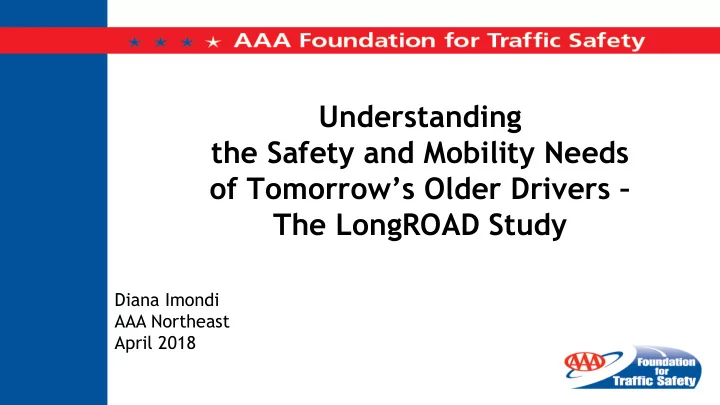

Understanding the Safety and Mobility Needs of Tomorrow’s Older Drivers – The LongROAD Study Diana Imondi AAA Northeast April 2018
The LongROAD Study The LongROAD (Longitudinal Research on Aging Drivers) study: Will generate the largest and most comprehensive database • about senior drivers in existence and will support in-depth studies of senior driving and mobility to better understand risks and develop effective countermeasures. Specific emphasis is being placed on issues related to • medications, medical conditions, driving patterns, driving exposure, self-regulation, and crash risk, along with mobility options for older Americans who no longer drive.
The LongROAD Study This multi-year prospective cohort study is being • conducted at 5 sites throughout the country, with 3,000 participants, tracking 5+ years of driving behaviors and medical conditions. The multidisciplinary team assembled to investigate this issue is led by experienced researchers from Columbia University, University of Michigan Transportation Research Institute and the Urban Institute.
Driving Cessation and Health Outcomes in Older Adults: A LongROAD Study July 2015
Key Findings Depressive Symptoms • Driving Cessation almost doubled the risk of increased depressive symptoms in older adults (OR= 1.91; 95% C.I. 1.61-2.27) Physical Health • Association between driving cessation and reduced physical functioning was strong in longitudinal studies
Key Findings Social Health • Refers to the capacity to interact in society, which can be measured by social engagement, social contacts, and satisfaction with social roles and social support • One study found driving cessation was associated with 51% reduction in the size of social networks of friends and relatives Over a 13-year period •
Key Findings Increased Risk of Mortality • Several studies found that driving cessation was a strong predictor of 3-year mortality risk • Non drivers were four to six times as likely to die as drivers
Associations Between Falls and Driving Outcomes in Older Adults: A Systematic Review and Meta-Analysis A LongROAD Study March 2016
Key Findings Increased Risk of MVC • A fall history significantly increased the risk of subsequent crashes • Older adults who had fallen were 40% more likely to experience a subsequent motor vehicle crash than older adults who had not fallen
Keeping Older Adults Driving Safely: A Research Synthesis of Advanced In- Vehicle Technologies A LongROAD Study December 2015
The Situation As the aging population continues to grow, the • personal automobile will increasingly be the preferred mode of personal mobility. • Advanced in-vehicle technologies have been proposed as potential ways to keep older adults driving for as long as they can safely do so, by taking into account the common declines in functional abilities experienced by older adults.
Implications • Advanced in-vehicle technologies can help extend the period over which an older adult can drive safely. • Vehicle manufacturers, dealers, and others need to explore new ways of training drivers to use in-vehicle systems. • Continuous technology improvement and testing is needed to meet the needs of aging drivers
Self-Regulation of Driving by Older Adults: A LongROAD Study December 2015
The Situation Questions about self-regulation • • Can older drivers correctly adjust their driving in response to their age-related declines? • What is the degree to which older drivers engage in self- regulatory behaviors? • What factors affect self-regulation? • To what extent does self-regulation actually improve safety and mobility for older drivers?
Key Findings 3 levels of self-regulation were identified • Strategic – decisions made by drivers before they actually embark on a driving trip • Tactical – practices that drivers engage in while they are actually on the road • Life-goal – larger decisions in life affecting driving more indirectly
Factors Associated with Self-Regulation Awareness and insight • Individuals’ awareness of their abilities influences their decisions to drive in challenging situations Driving confidence and comfort • Perceptions of confidence and comfort in specific driving situations are closely related to self-regulation
Future LongROAD Study Topics • General Driving Behavior • Use of Advanced Vehicle Technology • Health Behaviors and Social Health • Physical and Cognitive Functioning • Medication and Medical History
www.AAA.com/KeyTiming www.SeniorDriving.AAA.com
Recommend
More recommend